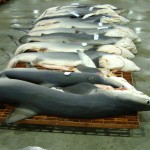 CAPE TOWN (SOUTH AFRICA)- Up to 24 countries may be catching sharks in the Atlantic Ocean and Mediterranean Sea but failing to report these catches, as is legally required by the Commission for the Conservation of Atlantic Tunas (ICCAT).
CAPE TOWN (SOUTH AFRICA)- Up to 24 countries may be catching sharks in the Atlantic Ocean and Mediterranean Sea but failing to report these catches, as is legally required by the Commission for the Conservation of Atlantic Tunas (ICCAT).
A new report by Oceana revealed these secret catches, based on Hong Kong shark fin trade data and other sources. The report was released today, at the 23rd Regular Meeting of ICCAT, in Cape Town, South Africa.
ICCAT
By comparing 2012 data on reported shark catches in ICCAT, the international shark fin trade, and vessels authorised to fish under ICCAT, Oceana identified two categories of countries that may not have complied with ICCAT regulations: (1) countries that did not report shark catches, yet exported shark fins to Hong Kong; and (2) countries that did not report shark catches, yet have ICCAT-authorised longliners, fishing vessels that are very likely to catch sharks.
“This year, ICCAT is finally in a position to penalise countries that flout their obligation to provide data on shark catches,” stated Dr. Allison Perry, marine wildlife scientist with Oceana in Europe. “Data reporting is the most basic requirement for responsible fisheries management – without knowing how many sharks are being caught, it is impossible to know what impact fisheries are having on these vulnerable animals.”
Shark finning
During this week, 47 Contracting Parties fishing highly migratory species in the Atlantic and Mediterranean will convene to discuss their management and conservation. Sharks will be high on the agenda this year, with key measures to protect threatened shark species under discussion, including the replacement of ICCAT’s weak shark finning regulation with a strict ban that would require all sharks to be landed with their fins still naturally attached.
Among the other major issues to be discussed is the management of overexploited bluefin tuna in the eastern Atlantic and Mediterranean. In addition, non-compliance by Contracting Parties will be broadly examined, with the possible application of penalties in cases where data have not been reported, or where illegal fishing has occurred.
Oceana
Maria Jose Cornax, fisheries campaign manager with Oceana in Europe explained: “We call upon the Parties to establish precautionary management and compliance as the guiding principles of this meeting. The precautionary approach shouldn’t only be limited to threatened species, but should also be applied where there is a high level of uncertainty – such as with Eastern bluefin tuna. This stock should be allowed to recover, and no quota increase should be considered.”
